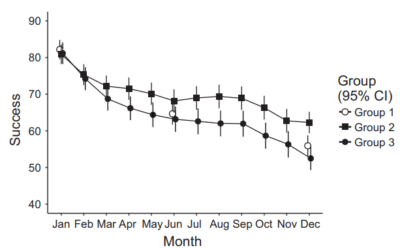
New Insights on New Year’s Resolutions
A Swedish Study’s Findings
Hello, Leslyn Keith here, with a deep dive into an enlightening study that’s perfect as we step into the New Year. Let’s explore a PLOS ONE December 2020 publication by Swedish researchers, offering rich insights into New Year’s resolutions. This study is particularly engaging for its thorough approach and relevance to setting and maintaining goals, a topic close to our hearts in the lipedema community.
The Aim of the Study
The study aimed to understand the types of New Year’s resolutions people set and the factors influencing their adherence. It specifically delved into the effectiveness of ‘approach-oriented’ versus ‘avoidance-oriented’ goals and the role of varying support levels in achieving these resolutions.
Defining the Terms
Approach-Oriented Goals: These involve adding new, positive behaviors or habits.
Avoidance-Oriented Goals: These focus on eliminating negative behaviors or habits.
The Methodology
A comprehensive online experiment was conducted involving 1066 participants from the general Swedish population. The study spanned one year and employed a mixed-methods design, combining quantitative and qualitative analysis.
Participants and Demographics
The participants (N = 1066) were a cross-section of the Swedish public, overwhelmingly skewed toward female (81%), married or had a partner (73%), had children (73%), employed (75%), and had a higher level of education (79% went beyond high school with anywhere from a few university courses to doctorate level education).
Assessment Techniques
Participants were divided into three groups based on the level of support provided:
- No Support: Basic guidance on setting resolutions.
- Some Support: Given the same information as Group 1, with some additional information about the importance of support. Asked to name a specific person responsible for supporting them throughout the year.
- Extended Support: All of the above, along with detailed guidance on setting SMART goals as well as interim goals, and education on overcoming obstacles and motivation.
Results Overview
 Categories of Resolutions
Categories of Resolutions
The most popular New Year’s Resolutions in this study (75% of participants) were concerned with improving physical health (33%), losing weight (20%), eating (13%), and-self-improvement (9%). All remaining goals were stated by 5% or less of the participants (mental health, smoking, finances, drinking, etc).
A majority of participants (64.5%) made resolutions that were stated as an approach-oriented goal and the majority of participants (59%) who stated a goal in this fashion considered themselves to be successful in sticking to their resolution.
Success Rates
There was an initial high rate of perceived success, which gradually decreased over time. Notably, participants with ‘some support’ reported higher success compared to those with ‘extended support’.
Impact of Support on Success
The level of support played a significant role in the success rates, with moderate support out-performing extensive support.
Conclusion
The study concludes that approach-oriented goals generally see higher success rates and that a moderate level of support is more effective than extensive guidance. Let’s highlight the key takeaways that can significantly influence how we approach our New Year’s resolutions, especially within our lipedema community:
- Optimal Support Enhances Success: Participants who received moderate support (some support) experienced greater success in adhering to their resolutions compared to those with either extended support or no support. This underscores the importance of finding a balance in the support we seek – enough to keep us accountable, yet not so much that it becomes overwhelming.
- The Power of Approach-Oriented Goals: Switching from avoidance-oriented to approach-oriented goals can significantly boost our chances of success. Focusing on positive additions (like incorporating a new healthy habit) rather than just avoiding negative behaviors (like cutting out a food group) can make our resolutions more sustainable and fulfilling.
- The Role of Goal Specificity: Interestingly, the study found that the specificity of goals might influence their success rates. Group 3, who were guided to form very specific SMART goals, faced a unique challenge. While specific goals like exercising twice a week are measurable and concrete, they also present a higher risk of perceived failure compared to more general goals like improving overall physical health. This finding suggests that while specific goals are good, they should be set with a degree of flexibility and realism to avoid discouragement.
- Interim Goals: A Double-Edged Sword: The study also revealed that setting interim goals, as was done by participants in Group 3, can be a mixed blessing. On one hand, these interim goals can help in breaking down a larger objective into manageable steps. On the other hand, they introduce multiple opportunities for perceived failure if these smaller milestones are not met, which can impact the overall motivation and progress.
Limitations and Suggestions
While the study offers valuable insights, limitations such as the self-reported nature of the data and the lack of long-term follow-up were noted. The researchers suggest further studies to explore these aspects more deeply.
Takeaway for the Lipedema Community
This research underscores the importance of setting positive, approach-oriented goals. For those of us managing lipedema, this means focusing on what we can add to our lives – be it a new exercise routine, a nutritious diet, or stress-reducing practices – rather than solely what we should avoid.
Tips for Our Community
- Set Positive Goals: Aim for habits that add value to your life.
- Find the Right Support: Lean on a support system that offers encouragement without overwhelming you.
- Be Specific and Realistic: Ensure your goals are clear and achievable.
Let’s apply these insights as we make our resolutions, not just for the New Year, but for a lifetime of managing lipedema with empowerment and knowledge.
Feeling inspired? Head over to our blog for more empowering insights and stories from the lipedema community. * 🌟 Visit Lipedema Simplified Blog
Thanks for joining me, and don’t forget to subscribe for more tips, tools, and research updates. Together, let’s embrace knowledge and support on our path to wellness!
